Megillat HaShoah (Hebrew)
Megillat HaShoah (Hebrew)
מערך שיעור לעשרה בטבת – קדוש השם וקדוש החיים – גב’ איטה פריד
Lesson for the 10th of Tevet – The Sanctification of G-d’s Name and the Sanctification of Life – Mrs. Ita Fried

Jewish survivors, both men and women, gather at what appears to be a mass funeral. The people are gathered around two coffins. Some participants are even sitting on the wall surrounding the area.
Kaddish in the Forest
Kaddish in the Forest
They dug a grave for her, and closed it over her. They piled stones on the grave so that they could find it later if they looked for it. Drago, who was standing next to Tusho, said, and he didn't know how the idea came to his mind: "Still, we should have said Kaddish."
"What should be said?" asked the commander. Twenty-two partisans stood motionless around the grave.
"The Jewish funeral prayer," Drago explained.
"Why a Jewish prayer?" asked the commander.
"Because she was Jewish. There are a few more Jews here."
"More Jews? Who is Jewish here?"
"I am!" "Me too!" "Me too!" answered three people.
"Well, say a prayer as you wish," said the commander, and his astonishment did not leave.
"Do you know how to say Kaddish?" Tusho asked Drago, "And is it permissable to say it only with 3 people (as opposed to a quorum of 10)?"
"I think so"
Three partisan Jews… decided to say Kaddish.
"Drago, say it!"
Drago began: "Yitgadal v'yitkadash Shemei raba" (May Your great Name be glorified and sanctified) His forehead was furrowed with deep wrinkles from the effort, his gaze wandered around in front of his friends, a thousand times in his life he said Kaddish by heart and fluently, without thinking and without getting confused… and now he neither knew nor remembered the tune, and the words had disappeared from his mind.
Since he didn't know how to continue, he stared at the grave, bowed his head and said: 'When you stand before Him, Zanka, before the Judge of the world, tell Him to look at what they did to you, what they did to all of us, look and see that there are not enough left even to say Kaddish for you, Amen.'
"Amen," repeated 22 partisans after him.
(Cited from: Matkowski, p. 464)

Jews burying desecrated holy items in a ghetto
Though I Walk through the Valley of the Shadow of Death
Though I Walk through the Valley of the Shadow of Death
Our group worked on repairing the road leading from the ditch to the camp. The road passed by the crematorium. The Westerbork camp was not an extermination camp, but the dead were not allowed to be buried, and all were taken to the crematorium.
We took a short lunch break. A strange idea came to my mind. Maybe I am the only one who will remain alive and will be able to testify that our dead were burned here, children and women, old men, young people, and even babies.
I turned to the gates of the crematorium. I marveled at my courage. I actually regretted it, I hoped the door would be locked. I pushed the main door and… the iron door opened. A few more steps, and here I am standing inside the crematorium, a not tall and strange building where iron pillars stood up to the ceiling, right in front of the entrance. A great terror fell upon me, what am I doing here? Did I come to see how the dead are burned? And maybe they'll catch me? There was a deathly silence around me, a terrible silence. Suddenly, so I imagined, I heard a moaning voice. Yes, a quiet voice. I was close to fainting. I was shaking. I felt sweat covering my whole body and my tongue sticking to my palate. I made a little progress. Yes, I heard clearly now. Voices could be heard here! Do the dead talk? Now I heard more clearly, a melody of prayer. Are the souls praying? I could hear the voices clearly coming from the right. I walked a few paces towards a small room. I looked and saw there… Jews. Those Jews I saw bringing in the dead. They sat and said Psalms in a sad tone.
I don't know if they saw me but I saw them. Like me, they wore the yellow Jewish patch on their clothes. They worked transporting the dead to the crematorium, but recited chapters of Psalms between bags. I walked back and left the building. I returned to my job, repairing the road. In that hour I learned a great thing. I learned that those Jews who worked there in the crematorium, to die of their terrible occupation, are no less good Jews than I am.
Many years after the Holocaust, I heard and read that before they cremated the deceased in the Westerbork camp, the workers tried to perform a "tahara" (purification) for the dead, as was customary. It should be added that these unfortunate Jews even recited chapters of the Psalms for the uplifting of the souls of the Jewish martyrs. God will avenge their blood.
(It Will Be Told To Generations - Yona Emmanuel)
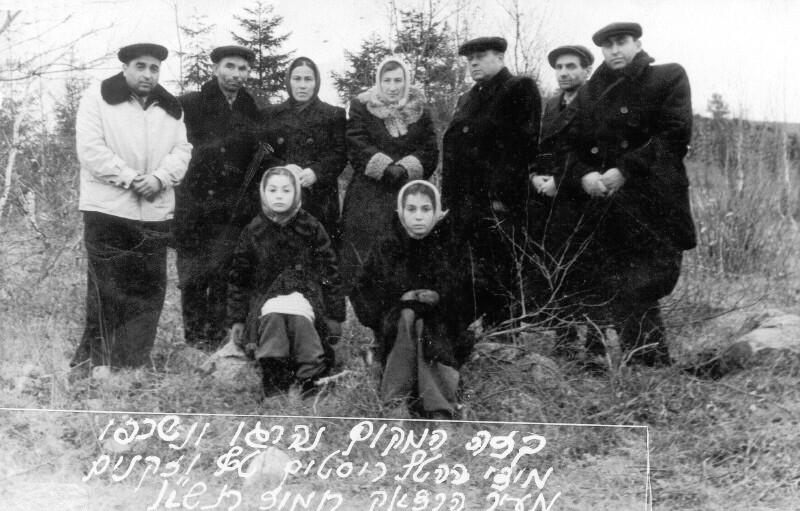
Surviving Jews next to the mass grave of the Jews of Gorodok
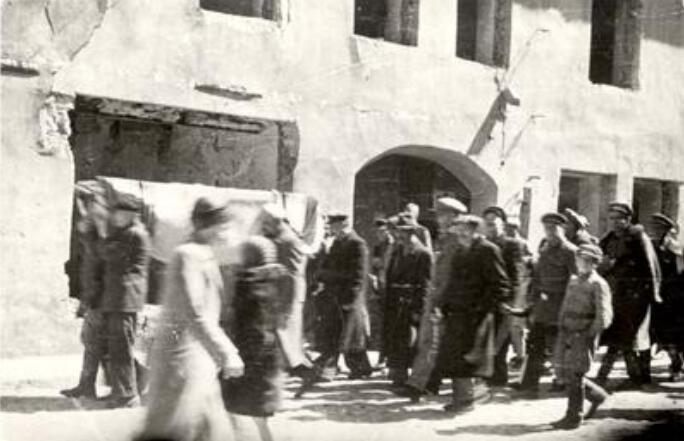
Jews of Vilna accompanying a coffin full of Torahs, that were desecrated during the war, to burial

The funeral for the Jews murdered in the Kielce Pogrom in July 1946
Kaddish for Oneself
Kaddish for Oneself
In Buna Monowitz there was a Jew named Mendel Hager, and he came from a family of Hungarian rebbes... It was perfectly clear to him that that he had to say Kaddish every day for himself. He would claim that every time we go to work, we go to our own funerals… His Kaddish shook our broken hearts, even Rabbi Levi Yitzchak of Berditchev had never said such a heartbreaking Kaddish…. One day he could no longer hold the hoe in his hand, but he still knew how to say the Kaddish for himself. We carried his body back to the camp, and I whispered to myself all the way "Yitgadal v'yitkadash" (Exhalted and sanctified)… Mendels like this have reached millions.
(Rafael Olevsky - The Tear)
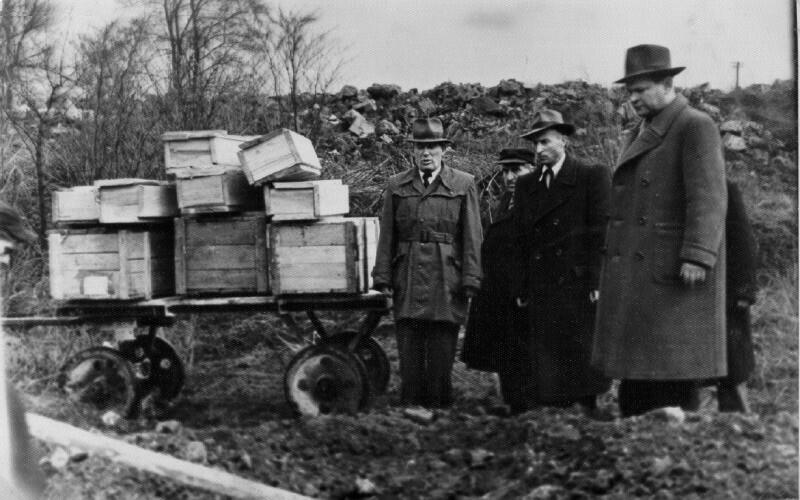
Jews moving coffins, containing the remains of Jews murdered in Plaszow, to the Jewish cemetery in Krakow
Aharon Fromer - "Those Who Never Yielded" (Lodz, Poland)

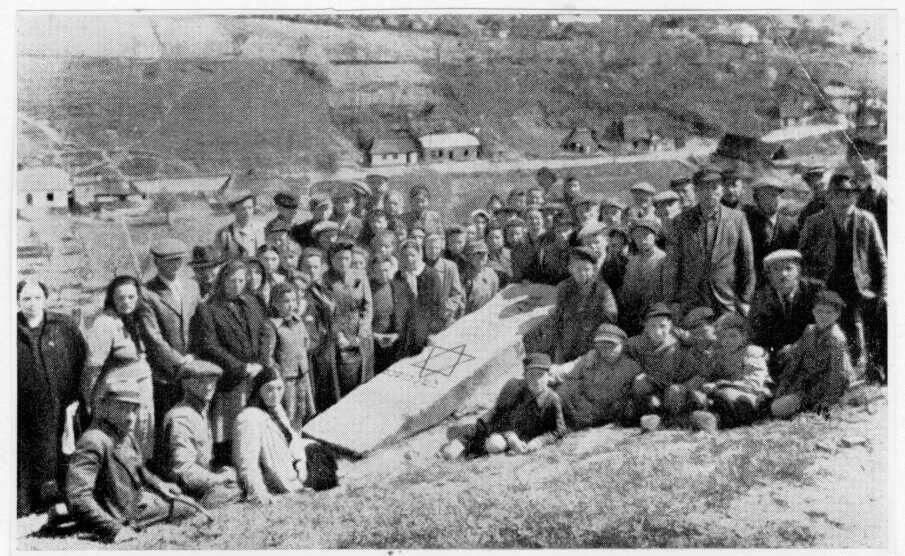
Jews around the gravestone marking the site of the mass grave of 3635 Jews from the Buczacz Ghetto
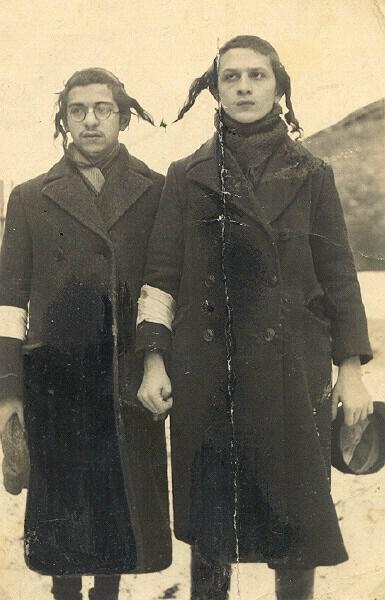
Chassidic young men, Waldwerand and Fruman from Zawiercie, tie to each other by their sidelocks. The two are wearing armbands.
Faith
Faith
There is nothing more beautiful in the world than to believe, to believe with unwavering faith in an ideal that is sacred in your eyes, in an ideal that you have chosen for the benefit of the people and the homeland. The holy faith against which all external reality becomes zero and there is no point in its existence except at most as a proof of the correctness of this faith. The faith from which we draw all our strength, to which we return all our strength to draw a new faith. The faith that every victory strengthens tenfold and defeat can only make it more solid, more massive, more surrendered and more rooted. After all, faith is the holiest thing of all that was and has been in our world. The same faith that is not related to houses or other objects. The faith that we carry within us and which after our death will be taken on by those who come after us, even more strongly, to create the strength to continue the ideal. "Faith" makes clear to us everything we need to be, how we should act, how we should believe. All this is included in our sacred word "faith".
And above all, our faith in the G-d of our ancestors, in our G-d, in the G-d of those who come after us, in the G-d of those who come after us, in the G-d of Israel, who guided us and kept us here through deep valleys of Sheol, a faith that we will never abandon lest we abandon ourselves, the faith that will accompany us forever. Until by its power we will win the victory, for which we have suffered and will suffer so much more, until with the help of our G-d, we will be able to ascend to our land and live there as one people in one land, with the one and only G-d.
And therefore, G-d, have mercy on your people and have mercy on me too, please have mercy on me with the abundance of your mercy and save me because otherwise I will be lost, You know that I only want to worship You. Have mercy G-d, mercy, mercy.
(Young Moshe's Diary, Moshe Flinker)

Surviving Jews bringing rolls of desecrated Torah scrolls for burial in the cemetery in Lodz.
Moshe Yaakov Leiman – The Laws of Sanctifying G-d’s Name (Hungary)


Surviving Jews following the recital of Kaddish at a mass grave
On Sanctifying the Name of G-d
On Sanctifying the Name of G-d
Among the rabbis who gathered in Kovno, the personality of Rabbi Elchanan Wasserman, one of the most prominent figures in the Torah world, stood out. He was recognized as the clear heir of the Chafetz Chaim rabbi z"l, with his lofty qualities, his actions and his leadership.
On the 11th of Tamuz 5701 (July 6th, 1941), he was sitting in the company of rabbis and heads of yeshivas, Torah elders who had gathered in the Kovno Ghetto and were studying Torah, when suddenly the gate of the house was broken and Lithuanian fascists burst into the room. At that time, Rabbi Elchanan was giving the daily lesson in tractate Nida of the Mishna, and all the participants were engrossed in explaining the issue that discussed the laws of impurity and purity… At first they did not pay attention to the outbursts. When the killers saw that their screams were not being noticed, they fired their pistols, and the people sitting in the room trembled and got up from their seats.
The murderers burst into cynical laughter, and one of them announced: "You wanted to organize a rebellion, to immigrate to Eretz Yisrael, but we caught you. You will not escape from us!"
An order was given: "Line up! Come with us!"
The rabbis and Torah scholars understood the meaning of the command, they stood in line… and in the midst of preparations "for their parade", Rabbi Elchanan turned to the people, in his quiet and calm voice, as was his custom: "Apparently in Heaven they see us as righteous, since they want us to atone with our bodies for Klal Yisrael, we must now do penance, immediately on the spot, because time is short. 'The Ninth Fort' (a killing site) is near. We must remember that we will truly be sanctifying the Name of G-d, we will walk with upright heads, and G-d forbid, an improper thought will arise, which is in a sense a falsification, which disqualifies the sacrifice. We are now fulfilling the greatest mitzvah of all: "Kiddush Hashem" (sanctifying the Name of G-d). The fire that broke our bones is the fire that will rebuild the Jewish people."
And so they marched in the Martyrs' Parade, with pride and honor they went to repent with their bodies for the Jewish People, 13 of the great Jewish men, led by the righteous genius rabbi, Rabbi Elchanan Wasserman, and they were killed on that day at the "Ninth Fort."
(Rabbi Ephraim Oshry, "The Destruction of Lithuania," New York 5712/1952 - I Believe)

Lipa Kaplan hiding his beard with a handkerchief in the Warsaw Ghetto
David Friedman – A Righteous Man in the Gas Chamber (Miskolc, Hungary)


Surviving Jews burying bodies after liberation

The recitation of the Yizkor memorial prayer at the burial spot of Jews who perished
Elyakim Holland – The Power of Faith (Hungary)

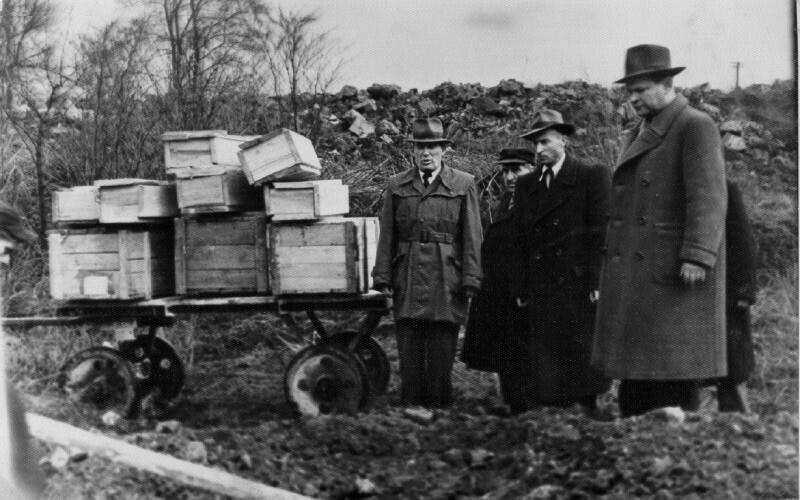
Jews moving coffins, containing the remains of Jews murdered in Plaszow, to the Jewish cemetery in Krakow
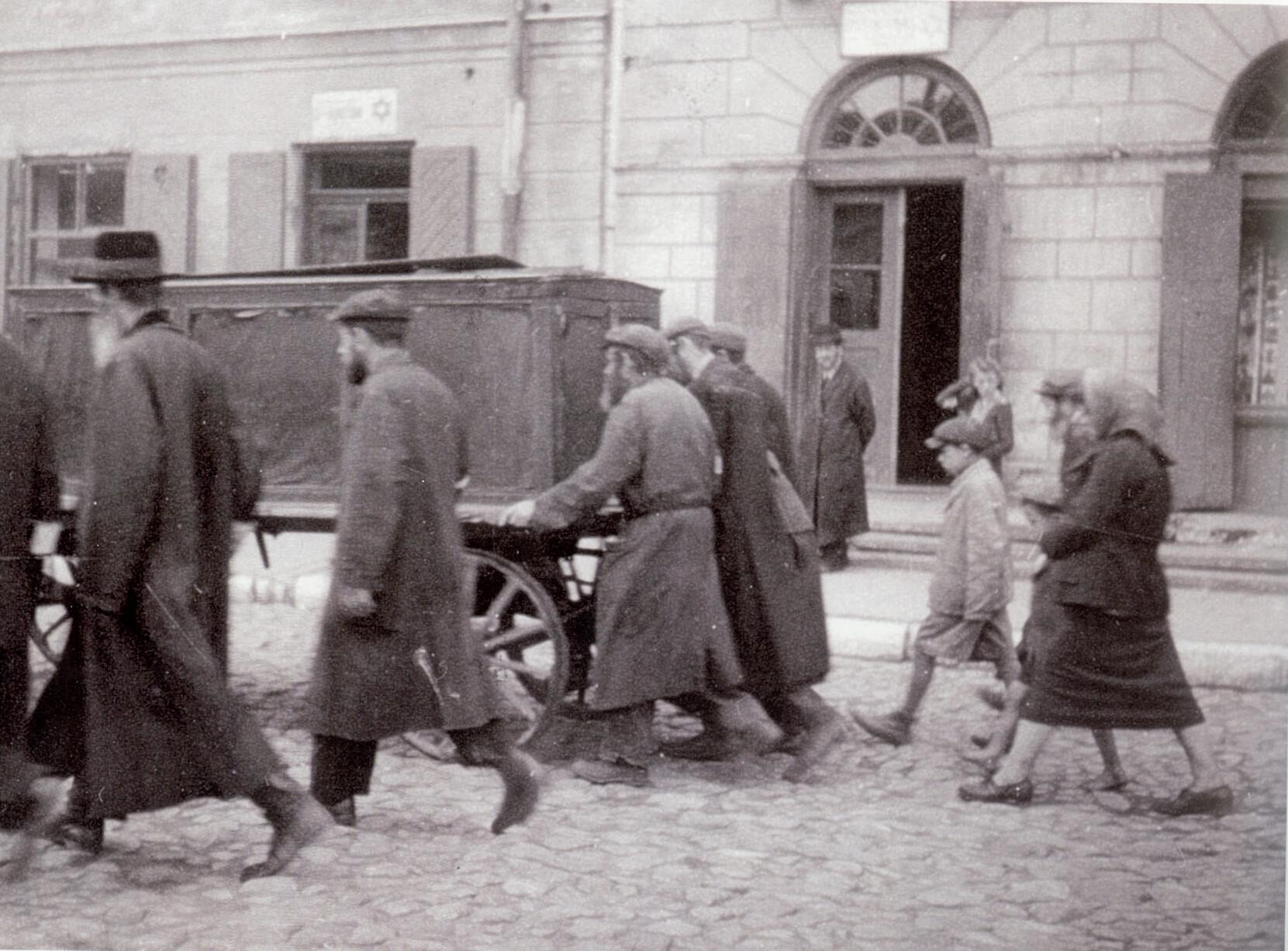
Jews accompanying the coffin of the Jew who perished in the Szydlowiec Ghetto

Jews from Grojec digging their own grave
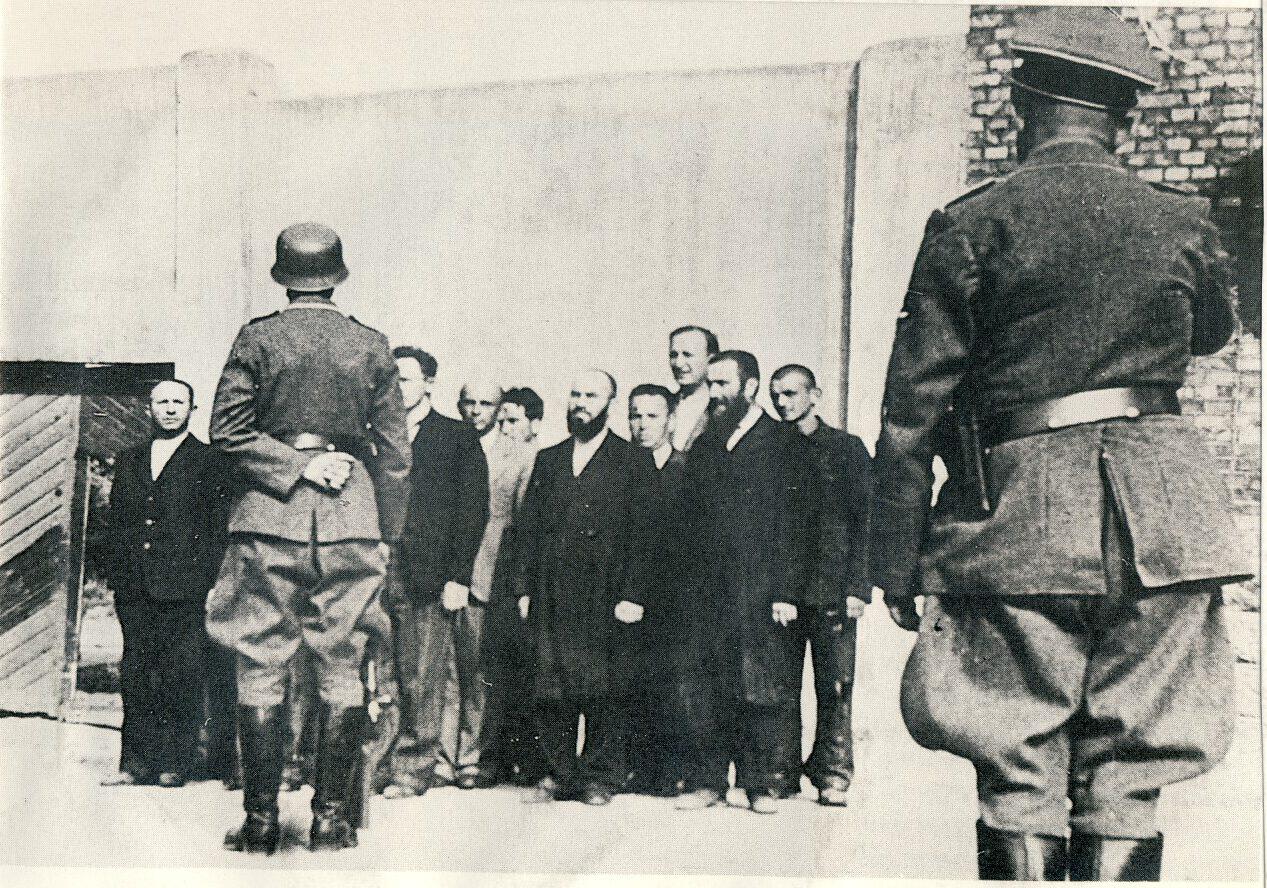
Rabbi Aharon Bakst from Siauliai and other Jews standing in a row in front of Gestapo men next to the “White Prison,” shortly before their murder
Tzvi Hirsch Feld – The Strength of Spirit (Poland)


Gerrer chassidim members of the “Chassidic Underground” in the Warsaw Ghetto standing in front of the factory of the German industrialist, Schultz, shortly after their arrest. Among those pictures are Leibel Prager (brother of Rabbi Moshe Prager), who is first from the left, Rappaport, and Levine.

Manis Zitnitzki (second from right) and his friends next to the gravestone marking the mass grave of Jews in Ebensee, Austria
On the Way to Santifying the Name of G-d
On the Way to Santifying the Name of G-d
On Cheshvan 3, 5703 (Oct. 14th, 1942), it was the Piotrkow community's turn, "Jews hide and don't go like sheep to slaughter!" called out Rabbi Moshe Chaim Lau, the rabbi of the city, to the members of his congregation. But he himself went and stood in the area for deportation with a small Torah in his arm. The killers knew who he was, because until his last day he kept his traditional clothes and beard, and if he went into hiding, they would conduct thorough searches and dozens would be discovered.
He explained this to those close to him. The organized murder continued for a whole week and the rabbi stood in the deportation area, witnessed the horrors that befell his community and remained standing on guard. "Why are we standing? Shall we attack them with our claws?" he called out to his friends. The head of the murderers, who was running like a predatory animal in the field, heardthe rabbi's cry, "The Jews need you there too" he shouted at him, and the rabbi went with the fourth and last shipment that liquidated the 25 thousand Jews of the Piotrkow community!
The author M.G., from Piotrkow, who went through all seven sections of the Nazi hell, gives an eyewitness report of the rabbi's last speech inside the death wagon, which led to Treblinka. The rabbi gave over Rabbi Akiva's saying that, "All my days I have been troubled, when will I be able to fulfill this" ("this" meaning serving G-d with your soul), and his speech was fiery and filled the listeners with intense emotion, fascinated them cut through flames of fire and filled with intense excitement, fascinated them, who had ignored what was expected of them. He demanded of them to go to their ends as Jews who are going to sanctify the Name of G-d, because every Jew who is killed for being a Jew is holy. "Better a death that has life in it than the life of this hour that death hovers over," he called out to the members of his community.
Mr. D.L., who escaped from Treblinka, told "we arrived early in the morning to Treblinka in the last shipment that left the Piotrkow Ghetto, on the platform near the train a selection was held, and together with some young men, I was taken out and placed across from a crowd of Jews from the city. We stood there in anticipation. The murderers carried out the last abuse, and we followed the groups that were led towards the gas chambers, from which no one came out alive. While we were standing and were confused, we suddenly heard the mighty voice of our rabbi, Rabbi Lau, who was standing with the group of Piotrkow Jews. We were shocked and our breath stopped when we heard his thunderous words. He began to loudly recite the confession prayer, and the group repeated it verse by verse, and followed him on their last path.
This was on the 11th of Cheshvan 5703 (Oct. 21st, 1942).
(The Way to Kiddush Hashem - Netzach Publishers, Bnei Brak)

A Jew from the Lodz Ghetto with a Torah that he removed from the synagogue on Wolborska Street, that was blown up by the Germans

A large group of surviving Jews participating in a mass funeral, carrying the coffin

Tallises (prayer shawls) returned to the Lodz Ghetto after their owners were murdered in Chelmno
Bentzion Weiss – Dying as a Sanctification of G-d’s Name (Neresnica, Czechoslovakia)


Mass grave of thousands of anonymous individuals

The British Army Rabbi reciting Kaddish over a mass grave in Bergen-Belsen
Yosef Dzialowski – A Lesson in Faith in a Labour Camp (Lodz, Poland)

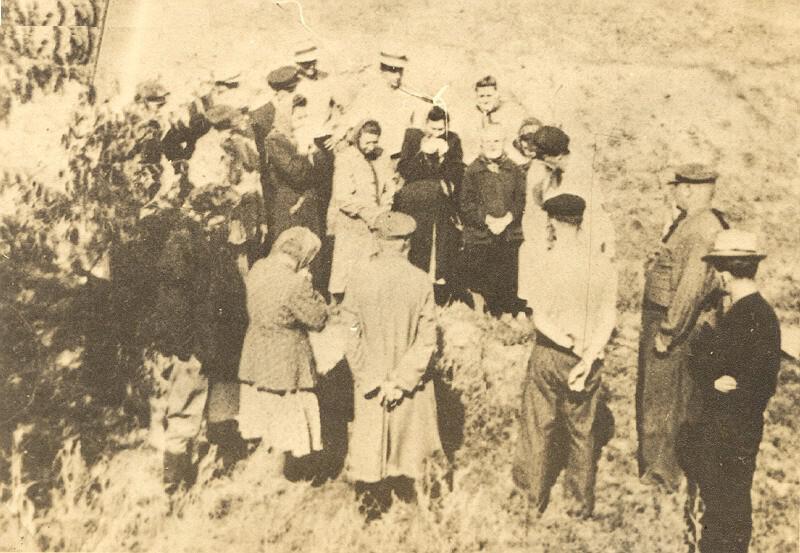
A group of Jews standing around a mass grave in the Lutsk Ghetto
The Great Kaddish
The Great Kaddish
And the time of the liquidation arrived. In Treblinka it took place. They were driven like animals to be slaughtered and killed. They were silent and received the judgment, and just as there was silence throughout the universe at the time of the giving of the Torah, here too there was universal silence. Those who were led to the slaughter fell silent and did not even utter a sigh, they did what the impure Nazis ordered them to do, they travelled and walked, bathed and prepared themselves for the day of leaving. Before they were placed in the gas chambers, the spiritual shepherd Rabbi Yerucham Neustadti stood and said: "Our path in life is now at its end. We are all being led to destruction, the fathers and mothers with their children together, not a soul will remain, and just as our silence is unnatural, so will they roll over our ashes, if at all - Let it be natural, let it be, and everything will be forgotten, that's why I say to you: We will say the Kaddish ourselves, which in good times our sons and relatives would say for us. We will justify the judgment upon us and sanctify the name of the Almighty whose actions are certainly justified and holy."
And then the great Kaddish was heard, which terrified the lion from his ambush and consumed his fury, due to the helpless ones, out of wild anger. Everyone opened their mouths in holiness and purity and said the Kaddish with great emotional and almost out of joy that they had the privilege of sanctifying the Name of G-d in public.
(Rabbi Alter Meir, "HaBoker," Tevet 10, 5711/Dec. 19, 1950 - Ani Maamin)

General Jurgen Stroop interrogates members of the “Chassidic Underground” shortly after being found learning Torah in their bunker in the Warsaw Ghetto. Amongst them is Leibel Prager (the brother of Rabbi Moshe Prager), Levine, and Rappaport.

Surviving Jews of Vilna, days after their liberation at Ponar, the site of a mass grave
Rabbi Sinai Adler – A Lesson in Faith (Prague, Czechoslovakia)

Avraham Wartheimer – Though I Walk in the Valley of the Shadow of Death (Medias, Romania)

Rebbetzin Sarah Friedman - 3 Rebbes at a Shabbat Meal (Bohush, Bucharest, Romania)

Rachel Herzl - Holding onto Faith (Hungary)

Eliezer Meyerowitz – The Power of Faith (Czechoslovakia)

Yaakov Yehoshua – Songs of Faith in the Westerbork Camp (Germany – Holland)





















































